Ataccama 14.4.0 Release Notes
This page contains the release notes for version 14.4.0 of the Ataccama ONE Gen2 platform. Release information affecting all modules in the platform can be found first, and module-specific information can be found in the corresponding ONE, MDM, RDM, ONE Data, and Data Stories sections.
Release highlights for this version include:
-
Add DQ Rules to Attributes: Apply DQ evaluation rules directly to attributes in the catalog item rather than just to terms.
-
[Metadata-based Detection Rules]: Detect terms using attribute metadata and not only data.
-
Data Reconciliation: Set up high-level checks of data consistency across multiple sources to ensure no data was lost or corrupted during migration.
-
New Approval Workflows: Use the new Review request workflow to automate how changes to data assets are reviewed and published.
-
Term Suggestions Improvements: Term suggestions are now calculated based not only on data fingerprints but also catalog item and attribute metadata.
-
Multilingual Support: Use ONE in your preferred language (English, Czech, French, or German). If your instance includes MDM, the MDM Web App can also be localized to one of these options: English, French, German, Italian, Czech, Russian.
-
Add or Pause Rules on Attributes: Add DQ rules directly to attributes without modifying the rule configuration for assigned terms.
-
New Data Explorer Tools in Data Stories: Gain valuable insights using Pivot tables or track performance trends and compare metrics using KPIs and Gauge charts.
-
Autocorrects and Enrichments in MDM: Use value suggestions in MDM Web App when you edit record values.
-
RDM UX Enhancements: Working with records in RDM is easier and more intuitive, allowing you to view more data at once and validate it on the fly.
Release Information
Products |
ONE Data Governance, ONE Data Quality and Governance, ONE RDM, ONE MDM, ONE Data, Data Stories |
|---|---|
Release date |
2023-06-23 |
Downloads |
|
Security updates |
Known Issues
| This section lists issues we are currently aware of which are considered significant, and which could impact the functionality of your build. We highly recommend reviewing this section before every upgrade. |
| Module | Issue | To be resolved in |
|---|---|---|
ONE |
ONE-43912: Deleted content security policy (CSP) is shown as still existing when creating a connection, if you try to use the URL of the deleted CSP. |
14.5.0 |
ONE |
ONE-44243: Users with read-only rights can still approve term suggestions. |
14.5.0 |
ONE |
ONE-44708: Previews do not work for Tableau. |
14.5.0 |
ONE |
ONE-45234: JVM argument |
14.5.0 |
ONE |
ONE-48553: Cannot delete a data source with MANTA integration enabled. To resolve this issue, make sure the MANTA integration is disabled before deleting the source. |
N/A |
ONE Data |
ONE-44486: Importing invalid DQ records from a catalog item to ONE Data fails if the catalog item has any component or aggregation rules applied. |
N/A |
ONE Data |
ONE-41741: If importing a dataset (for example, a catalog item or a file) fails, a table is created in ONE Data containing no or partial data. This prevents you from reimporting the dataset under the same name as the table name must be unique. To import the dataset using the original name, delete the table first and then try importing again. |
N/A |
MDM |
ONE-44522: In PostgreSQL-based MDM solutions, a performance slowdown is possible, which might affect draft publishing speed. |
14.5.0 |
MDM |
ONE-59667: Occasionally, MDM server fails to start when there is a session in the To resolve this issue, manually delete all sessions in the state |
14.5.4 |
ONE |
ONE-51198: Although it is possible to mention groups in comments, group members will not be alerted. It will not be possible to mention groups after the fix. |
15.1.0 |
Known Issues Resolved
We report known issues in each release. Below is the list of the issues that have been resolved across the platform for this version.
| Module | Issue | Reported in |
|---|---|---|
ONE Data |
ONE-42387: If data quality filters are applied, you cannot update attribute values in bulk (Multi-edit values option). |
14.3.0 |
ONE |
ONE-41271: The MANTA lineage tab is not working properly for catalog items imported from the Oracle source. |
14.3.0 |
ONE |
ONE-42000: Profile and DQ Insights screen is not dynamic and needs a refresh to present the changes after deleting a term. |
14.3.0 |
ONE |
ONE-41895: Full-text search does not work for the custom entity as a navigation item on the listing view. |
14.3.0 |
Platform Changes
Java 17 Upgrade
ONE components are now shipped with and support Java 17 where applicable.
All servers running ONE components need to be upgraded to Java 17 when upgrading self-managed, on-premise deployments to version 14.4.0.
For more information, see ONE Gen2 Upgrade Guide, MDM 14.4.0 Upgrade Notes, RDM 14.4.0 Upgrade Notes.
ONE
Add DQ Rules to Attributes
It is now possible to apply DQ evaluation rules directly to attributes in the catalog item rather than just to terms, meaning that you can run the same evaluation in the catalog as in monitoring projects.
This is important in cases where results have been exported from monitoring projects, remediated in ONE Data, and now, you want to re-evaluate them from the catalog. For more information, see Add DQ Rules to Attributes.
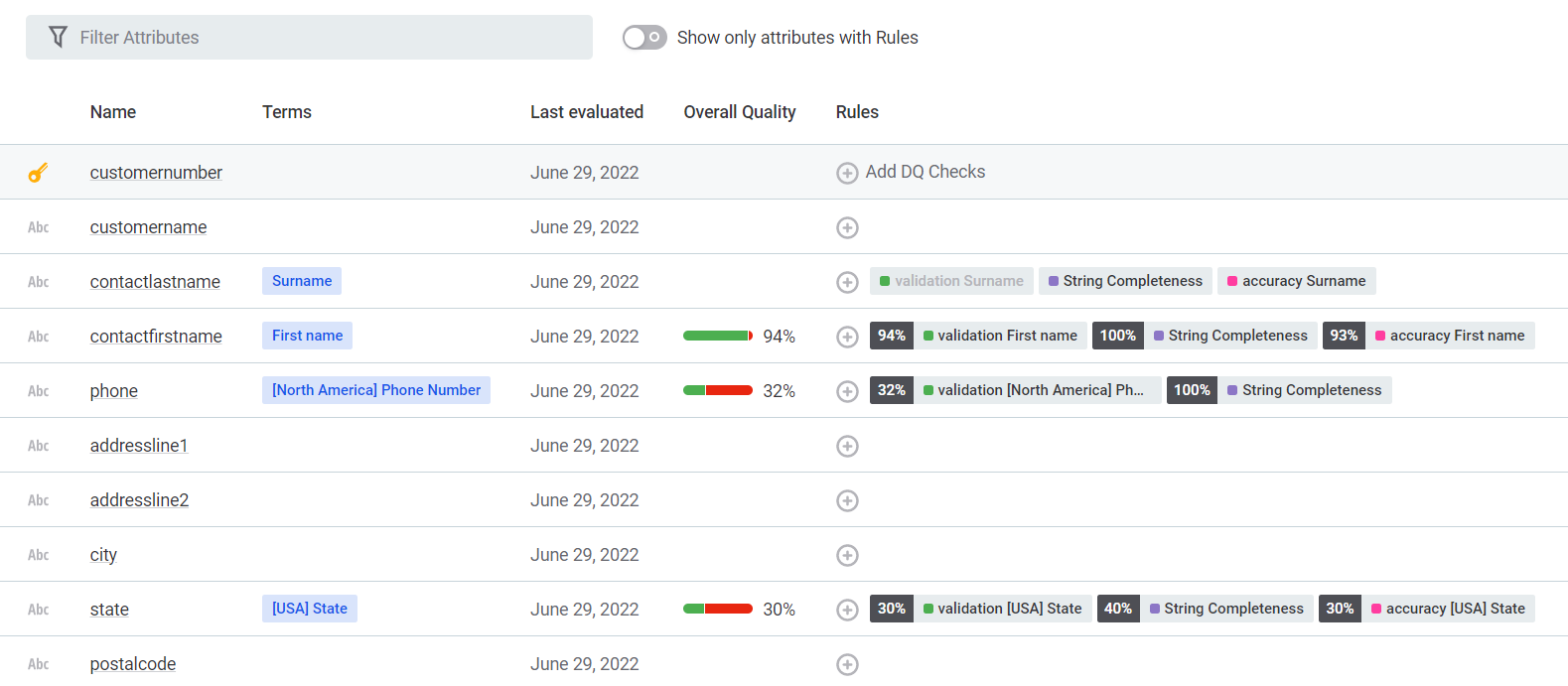
Metadata-Based Detection Rules
We introduced a new type of detection rules: rules based on metadata. Similarly to the existing data-based detection rules, they are used for term detection during profiling.
Metadata-based rules help assign terms based on the attribute name and can be used together with data-based rules, which increases the accuracy of term detection during profiling. For more information, see Detection and DQ Evaluation Rules.
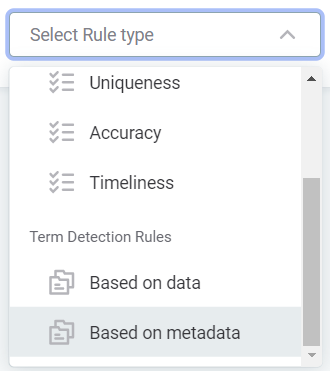
| Metadata rules can be excluded from term detection to ensure better performance of ONE. For more information, see Term Detection. |
Data Reconciliation
The data reconciliation feature provides high-level checks of data consistency across multiple sources. This allows you to verify, for example, that the target data is the same as the source data when migrating from one database to another, so you know that the original data was transferred without any data leakages or malformations. For more information, see Data Reconciliation.
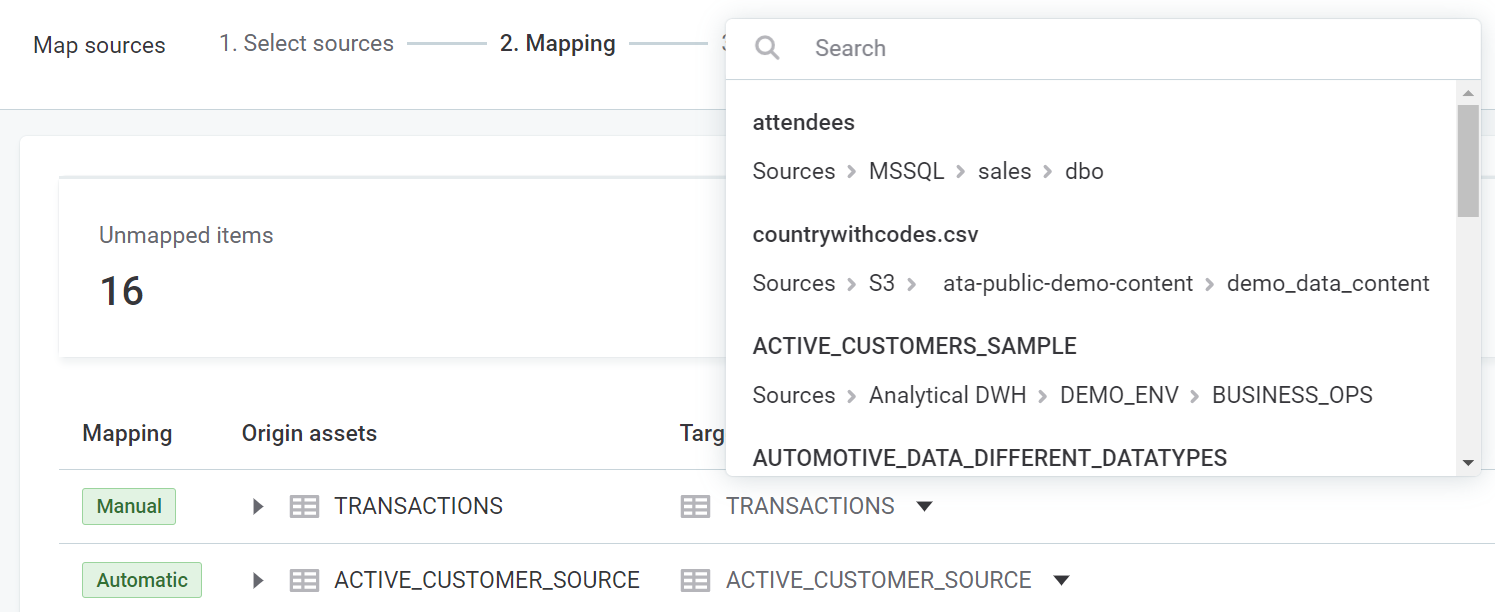
New Approval Workflows
We renamed the approval workflow to Review request workflow. In addition, all workflows are now managed from a single place: the Workflows tab.
The Review request workflow offers additional automation for requesting reviews of changes made to data assets and publishing these changes in ONE. If you have editing access level on an entity and are making changes to an asset, you can use it to send your changes for review. After this, the person responsible for the task can reject or approve and publish your changes. For more information, see Publish Changes and Workflows.
| There is an additional workflow called Approval Workflow Migration that you must complete when you first start the application after upgrading from a previous version of ONE. For more information, see ONE Gen2 Upgrade Guide. |

Term Suggestions Improvements
-
Term suggestions are now calculated based not only on data fingerprints but also metadata, which helps improve the accuracy of term suggestions. In addition to fingerprints, the following six features are now taken into consideration when identifying similarities between attributes:
attribute name,attribute comment,attribute data type,catalog item name,catalog item description, andsource ID. You can configure which features you want to include in the process of generating term suggestions. -
In addition, the Term Suggestions services are now stateless, which means that the memory usage of all services doesn’t scale with the amount of data and remains stable. For more information, see terms:term-suggestions-overview.adoc.
-
You can now see the date and time of the last state of the catalog which is fully reflected in the term suggestions. For more information, see terms:term-detection.adoc.
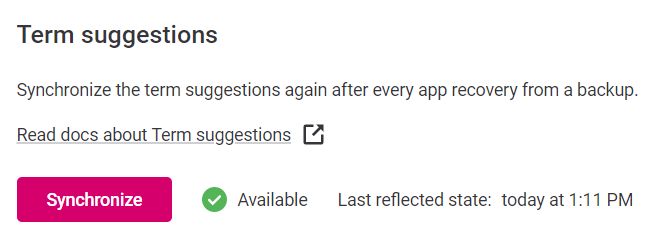
Support for Databricks Job Cluster
By default, Databricks uses a perpetually running generic cluster (with autosleep) that is configured once and can run multiple Spark jobs simultaneously. You now have the option to use a dedicated Databricks Job cluster.
With this type of cluster, the Databricks job scheduler creates a new job cluster whenever a job needs to be run and terminates the cluster after the job is completed. Depending on your use case, this can bring the following advantages:
-
Lower Databricks cost.
-
Dedicated resources for each job.
For more information, see Databricks Configuration, Databricks job cluster configuration section.
Multilingual Support
You can now change the language of ONE to your preferred option. For more information and other basic features, see Application-wide Features.
Currently, the following languages are available:
-
English
-
Czech
-
German
-
French
| Take note that not all UI text is fully localized and you might still encounter English in some parts of the application regardless of your personal settings. |
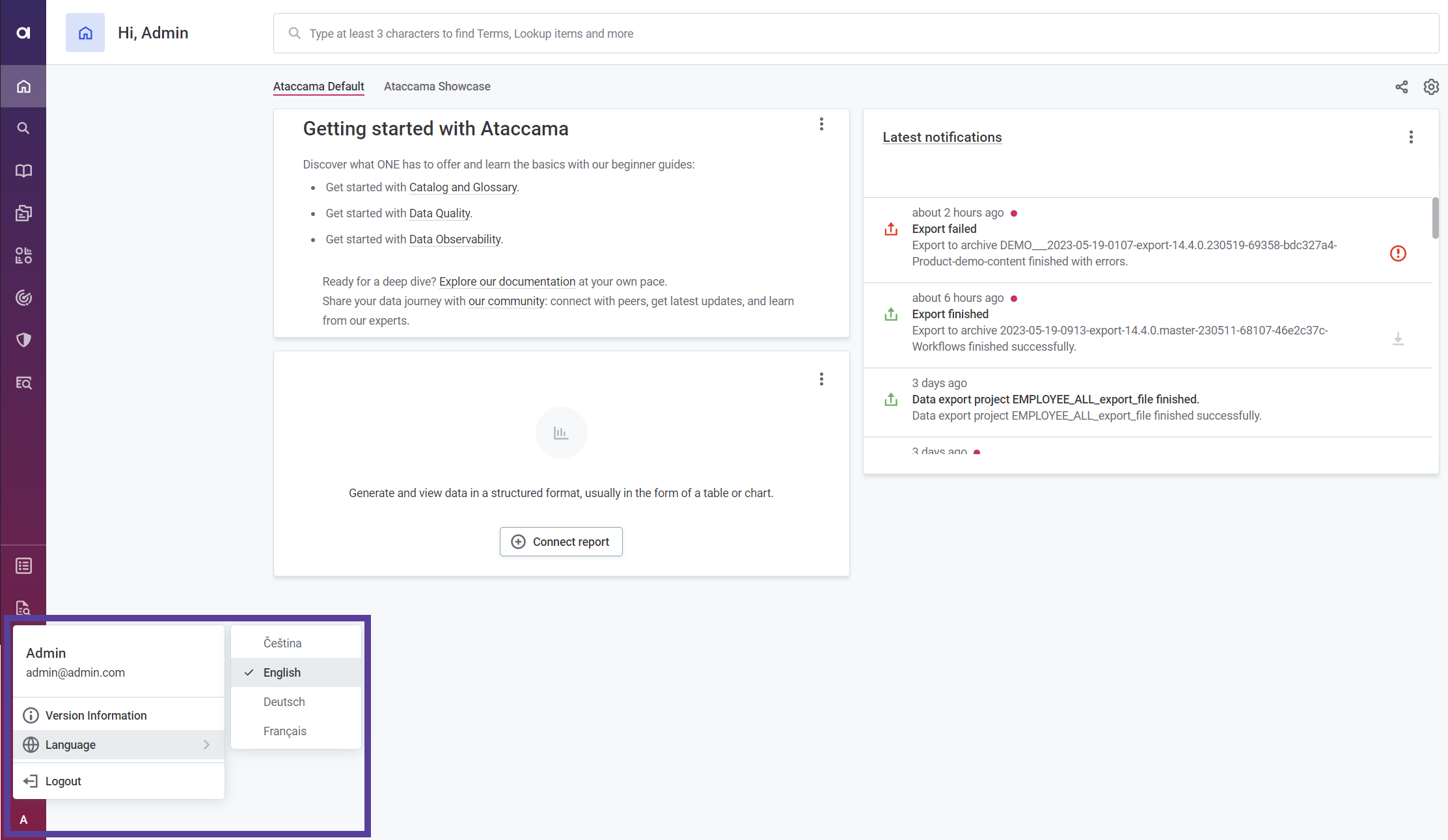
Audit Improvements
Audit log entries related to sharing access and stewardship assignment (Manage access and Transfer stewardship) now include information about the access levels, groups, and users involved in the operations.
You can find this information in the new Additional Information card after selecting a relevant log entry. For some properties, you can drilldown for further details.
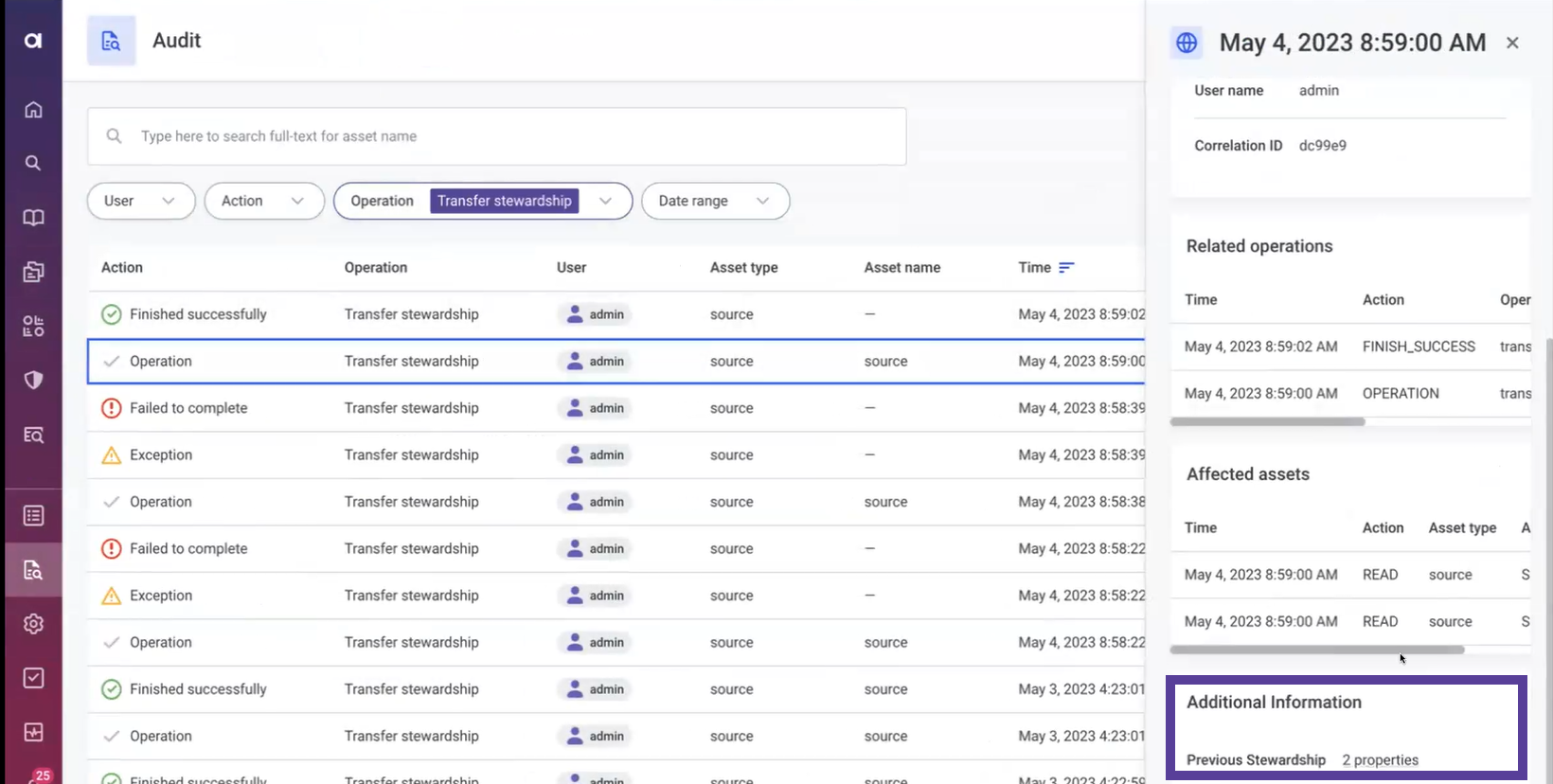
The information can be exported as part of the audit_export_operations_YYYY-MM-DD.csv, specifically in the "details" column.
For more information, see Audit.
|
ONE Data
Add or Pause Rules on Attributes
Add any DQ rule directly to catalog item attributes from the table or the attribute details sidebar. This allows you to apply specific DQ rules on particular attributes without modifying the default rule configuration for any of the assigned terms.
To do this, expand the list of DQ rules on the attribute and select Add Rule, then choose all rules that you want applied. Alternatively, right-click the attribute name and select Open details. The Add Rule option is available under DQ Rules.
If you change your mind or no longer want to use a manually assigned rule, select the X icon next to it to remove it and publish the changes.
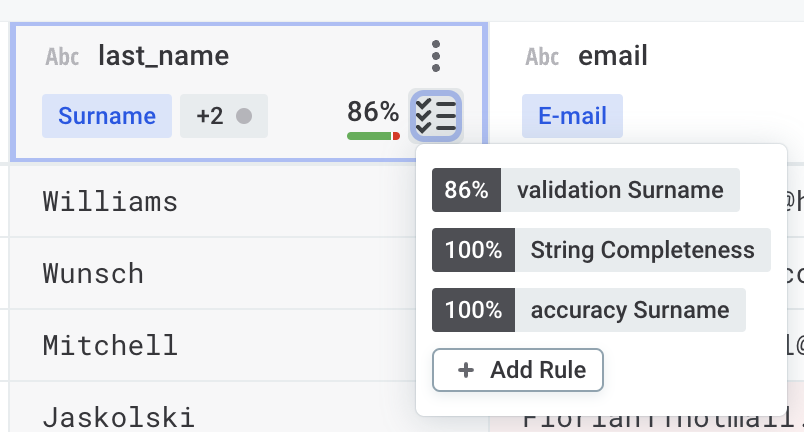
You can also pause applied rules either directly from the table or from the attribute details sidebar by clicking the pause icon. After you publish the change and rerun DQ evaluation, the rule is no longer used in evaluation until you reactivate it.
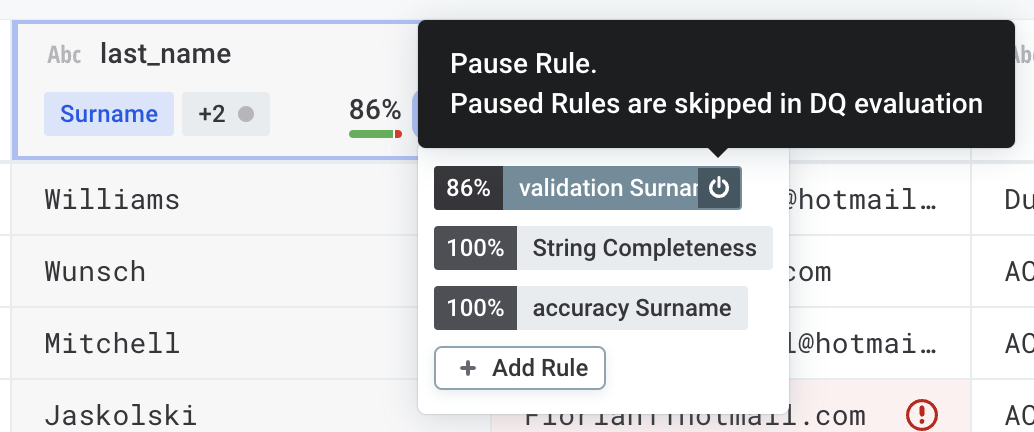
| To learn more about the feature in general, see [data-quality:add-dq-rules-to-attributes]. |
Import Records with DQ Results
When creating a table from a catalog item, you can now import the entire dataset together with DQ results to ONE Data, which lets you use DQ filters in ONE Data right after import. Previously, importing DQ results was available only for invalid records.
To do this, select the catalog item you want to export to ONE Data and then choose the following options: Full (data with DQ results) and All records. For more details, see Create a Table.

| If you’re importing data with DQ results, you cannot choose which attributes are imported. In case you want to modify the table structure, you can do this once the data is available in ONE Data. |
Performance Improvements
Importing datasets into ONE Data is now significantly faster: if your table contains 20 attributes, the data is loaded 70 times quicker compared to the previous version, provided that the import does not include DQ results. The actual loading speed depends on the number of attributes and records in the table.
| While we improved the import speed, ONE Data is not yet fully optimized for working with large datasets (over 50k records) and you might run into issues with multi-editing, filtering, and navigation. |
Data Stories
This release brings you a refreshed user interface, improved filtering experience in Data Explorer, and new tools: Pivot Tables and KPIs and Gauge Charts. Seamlessly integrated into Data Explorer, these features help you easily analyze your data and present your key metrics with clarity. Check the following sections for more details on the changes.
UI Enhancements
-
We revamped the Data Stories homepage, Reports, Add a dataset, and Create a visualization screens so that they are better aligned with the rest of the platform.
-
In Preview mode for Stories, you can now see the section names in addition to step names in the table of contents, allowing you to navigate more smoothly.
Data Explorer Improvements
-
Boolean attributes in Data Explorer are now accurately represented with the appropriate icon.
-
We enhanced the filtering experience in Data Explorer:
-
Recommended attributes used in charts are displayed above the horizontal line in the filter list by default so they are easier to access and select.
-
We introduced a direct filtering option that you access by clicking the three dots icon on specific values in the Dimensions column. Add these values directly to the filter conditions using the equal to operation. This feature is supported for text and date attributes.
-
Pivot Tables
We introduced a new powerful tool for efficient data visualization and analysis: Pivot tables. This brings you the following advantages:
-
Easily summarize, sort, and reorganize data to gain valuable insights. Pivot tables are responsive and adapt to the available space.
-
Use pivot tables across different workflows, as they are seamlessly integrated in Data Explorer.
-
Customize the display and properties to present data in the most meaningful way.
We removed Data Grid widget as pivot tables offer more customization. If your previous stories or dashboards used a Data Grid widget, you can still see it in your report, but you can no longer interact with it, update it, or create a new one.
| To learn more about pivot tables in Data Stories, see Pivot Table. |
KPIs and Gauge Charts
Data Stories now offers KPIs and Gauge charts, allowing you to present and customize key metrics with clarity. Create visually engaging KPIs and Gauge charts to track performance trends, compare metrics, and visualize progress towards targets.
You can also integrate KPIs and Gauge charts into stories for enhanced storytelling and impactful data communication.
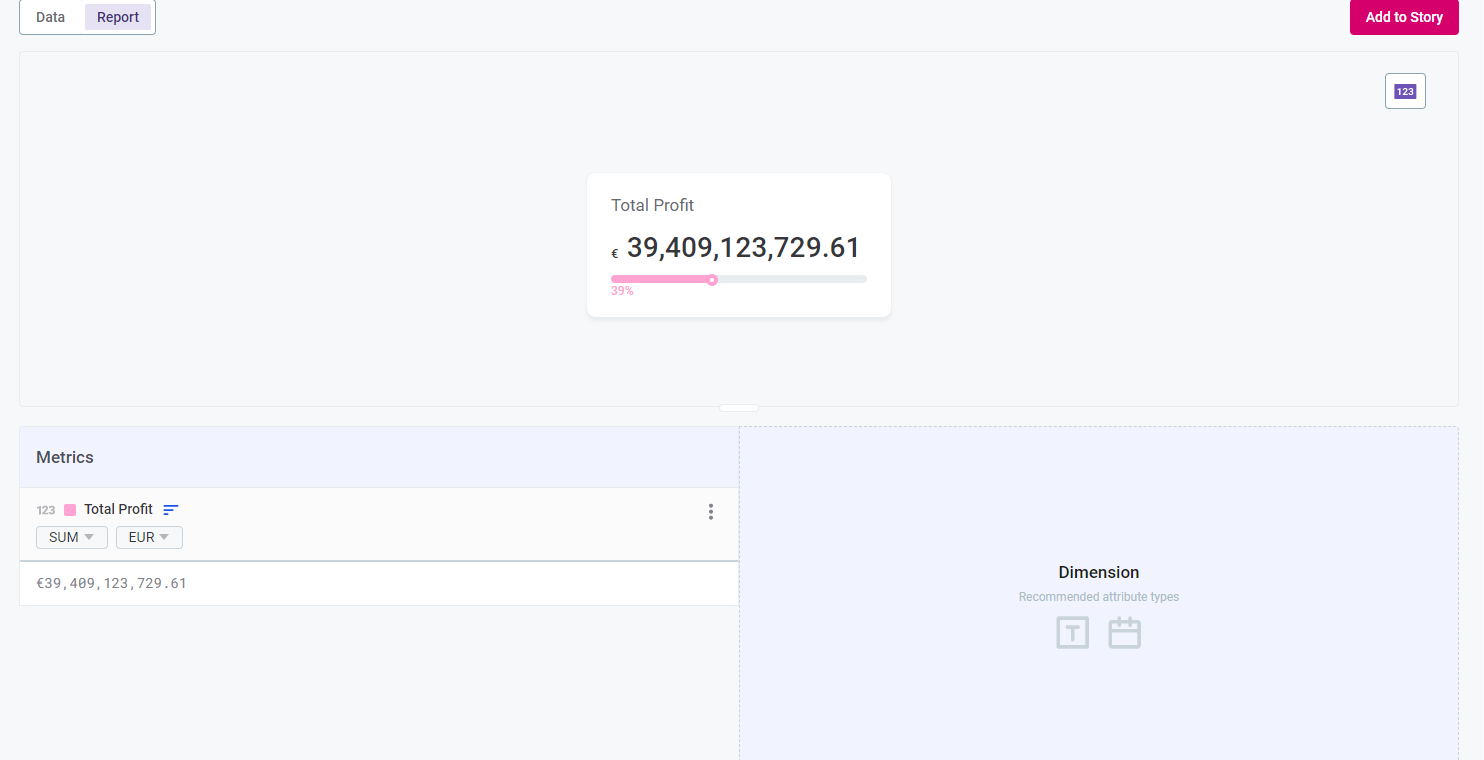
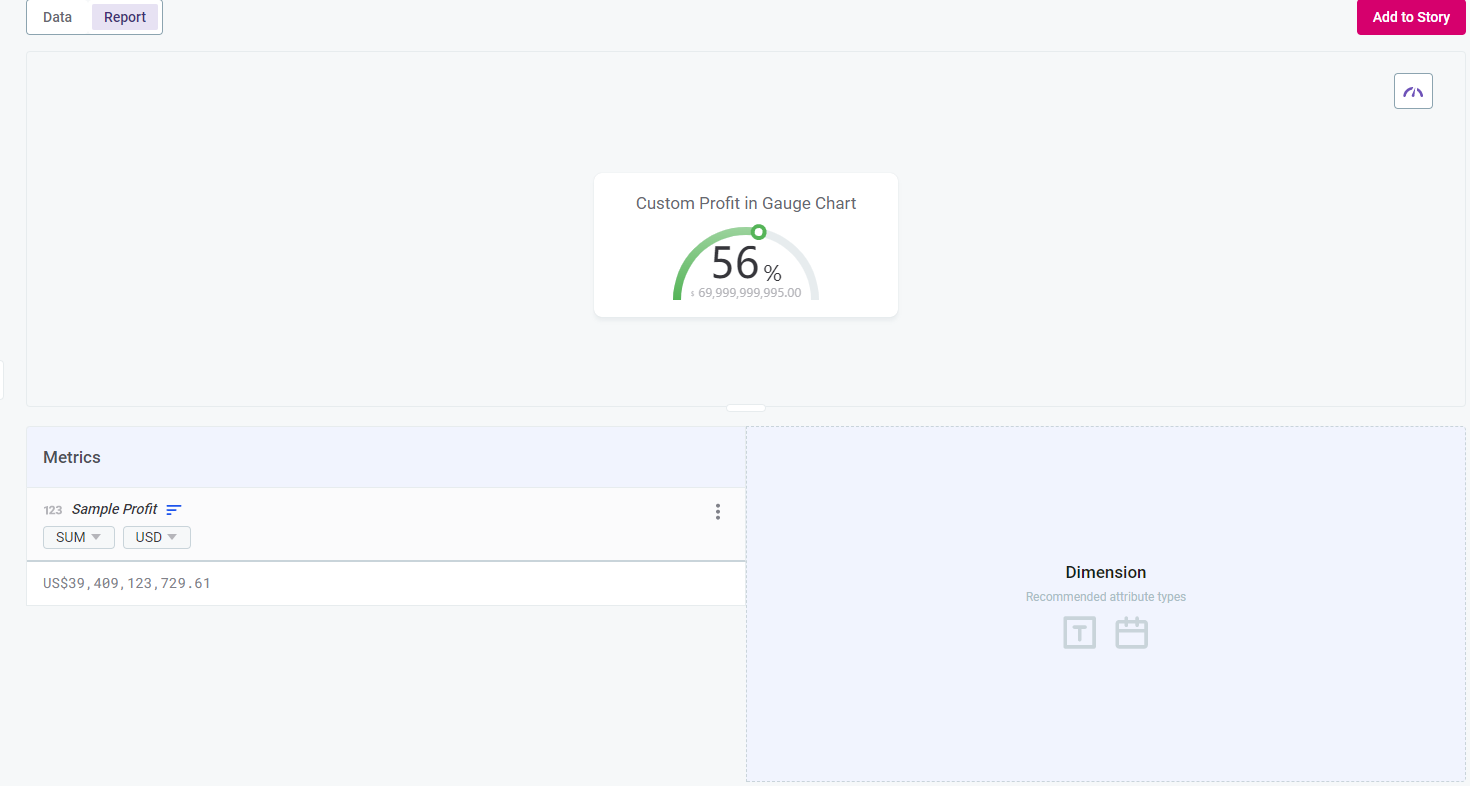
| For an optimal experience, we recommend using Pivot tables, KPIs, and Gauge charts primarily in Data Explorer. |
| To learn more about these new features in Data Stories, see KPIs and Gauge Charts. |
MDM
Localization
MDM Web App can be now localized. Attribute labels, validation messages, and reference data can be translated to one of the supported languages: English, French, German, Italian, Czech, or Russian.
After you switch the language in the application, the translation to the currently active language is used automatically if available. The functionality needs to be manually configured first.
To learn more about localizing validation messages, see Configuring Validations, section Localize validation messages. For more information about reference data localization, see Working with Reference Data, section Reference data localization.
Autocorrects and Enrichments
You can now use value suggestions in MDM Web App when you edit record values.
Autocorrects are suggestions of correct values based on simple underlying rules (for example, capitalizing the first name) and are applied to one field.
Enrichments provide one or more value suggestions based on more complex logic and allow to automatically populate several fields. For example, after filling in the street, the enrichment can help you add the whole address. Confidence is provided as part of enrichment suggestions so that you can select the set of values based on the score.
To use autocorrects and enrichments, you need to configure them first (see Configuring Enrichments and Autocorrects).
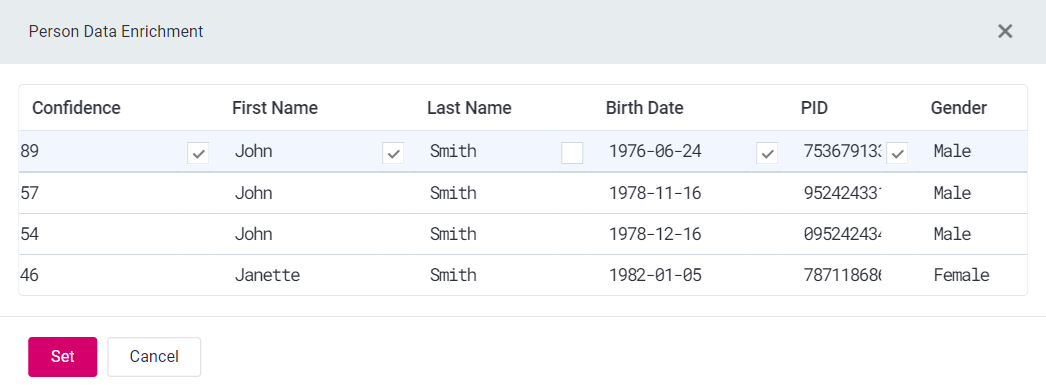
Upgrade Notes
To determine your upgrade path, see MDM Upgrade Procedure and MDM 14.4.0 Upgrade Notes.
RDM
UX Enhancements
We made working with records in RDM easier and more intuitive. The Create record and Edit record dialogs are now sleeker and simpler, allowing you to view more data at once and validate it on the fly.
Improved Validation
New or updated attributes values are now validated automatically, as soon as you enter them, and validation errors or warnings are displayed directly on the attribute. Hover over the icon to learn more about the issue. You can save your changes only after all issues have been fixed.
In addition, changed values that haven’t yet been published are highlighted with an orange dot, allowing you to understand the state of your data at a glance.
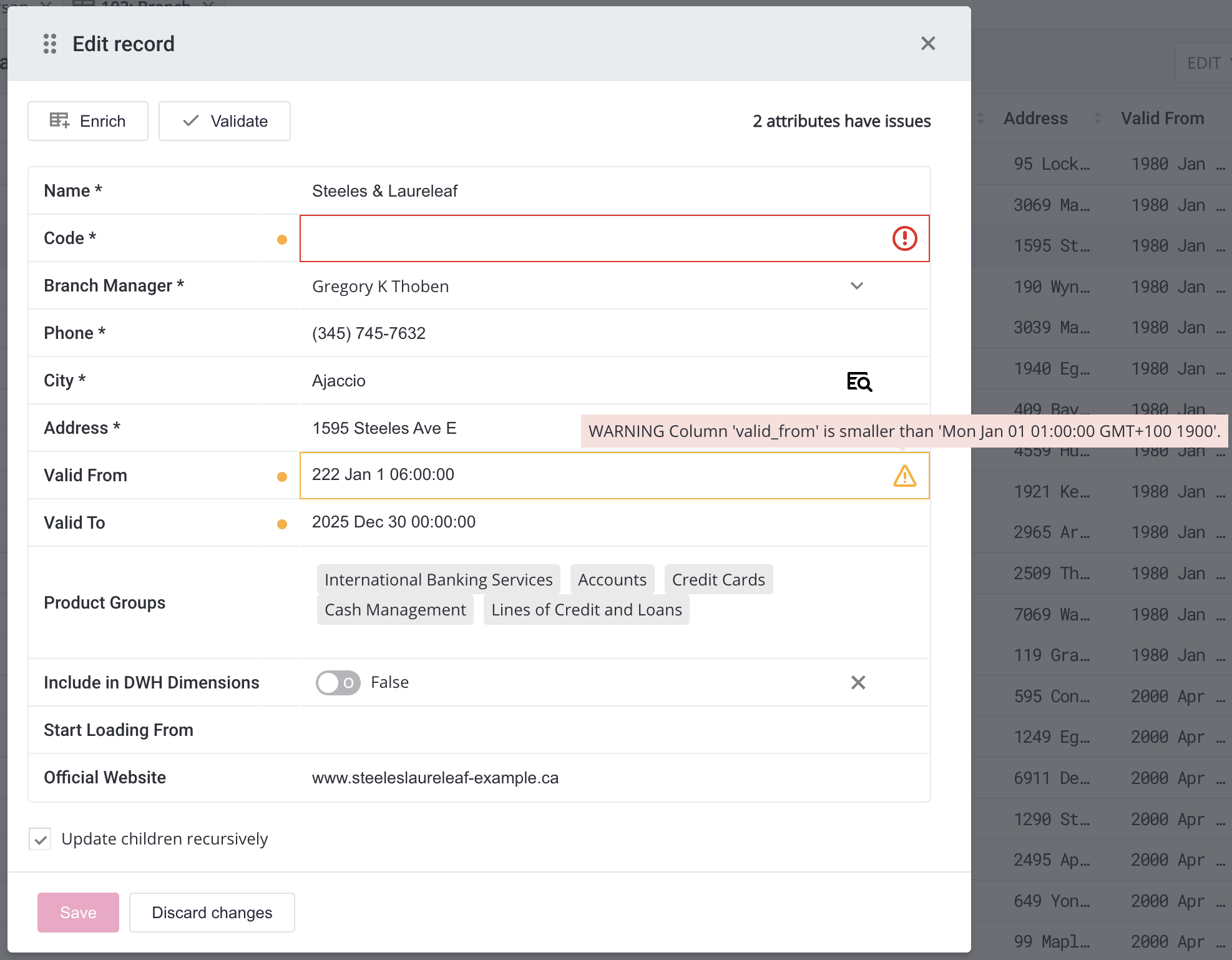
Any validation issues on the row level are shown at the top of the record detail screen.
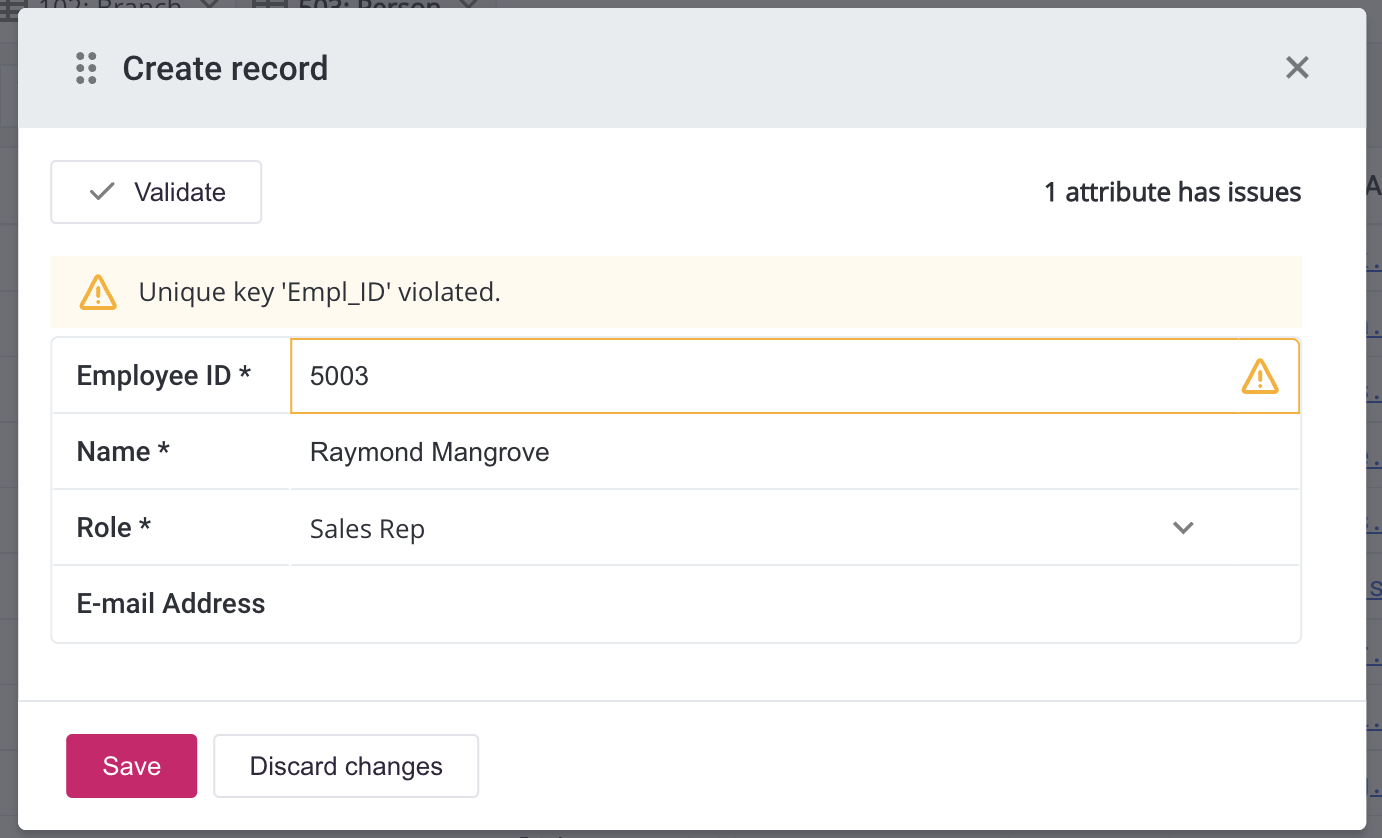
Upgrade Notes
To determine your upgrade path, see RDM 14.4.0 Upgrade Notes.
Fixes
ONE
Click here to expand
-
ONE-44033: Added ability to enable the
getProfileDataoperation required for viewing profiling results for theView metadata accesslevel via GraphQL. For more information see, Access Levels -
ONE-44460: Extended the configuration options for the GraphQL introspection feature. For more information, see MMM Configuration, GraphQL Configuration section.
-
ONE-43650: Changes in DQ not flagged by AI anomaly detection after constant values.
-
ONE-43523: Unnecessary sections removed from term occurrence screen.
-
ONE-43348: DQ evaluation is now working on Snowflake with pushdown enabled.
-
ONE-43302: DQ rule with more than 10 inputs now displayed correctly in configuration.
-
ONE-43071: Business readiness endpoint added to the Comments service.
-
ONE-42649: Anomaly detection now working even when some features of attribute profiles are missing.
-
ONE-42646: All available files now visible in the Export tab of a monitoring project.
-
ONE-42506: Data Quality view fixed for data consumer.
-
ONE-42492: Demo monitoring project 'Financial Securities Failures' no longer exceeding filter limit.
-
ONE-42462: Results now showing on DQ evaluation graph immediately after job is finished.
-
ONE-42354: All users now visible in the users list for notifications.
-
ONE-42293: Changes to implementation of
termDetectionIssueto avoid problems with performance. -
ONE-42291: Details of the number of anomalies detected included in Anomalies column in Data Observability.
-
ONE-42214: Performance improved when querying catalog items.
-
ONE-42211: Paths added to Data Observability issues listing.
-
ONE-41944: Total number of passed and failed rules now displayed correctly in demo data monitoring project report.
-
ONE-41694: Document button no longer unavailable after editing observed schemas in Data Observability.
-
ONE-41087: Changes in schema selection in Data Observability recognized and new configuration taken into account in future monitoring.
-
ONE-41087: Notifications for Data Observability grouped on catalog item level.
-
ONE-40826: Column widths consistent in Data Observability schema changes table.
-
ONE-40639: Recommended actions visible in All Issues view in Data Observability.
-
ONE-40475: Search added to Data Observability issues listing.
-
ONE-38956: Close all issues button disabled when you are viewing only closed issues in Data Observability.
-
ONE-41345: Optimized the query used to list catalog items.
-
ONE-43221: Fixed the issues that prevented exporting data to a database or ONE Data when accessing the catalog item from ONE Data.
-
ONE-39944: Profiling jobs are no longer stuck in postprocessing state if postprocessing fails.
-
ONE-43687: ONE Desktop now correctly uses proxy for connection to ONE.
-
ONE-41419: Data export downloads are now logged in Audit.
-
ONE-42635: Removed the feature flag for Submit queue. DPM now only uses the default implementation.
-
ONE-41240: DPE, DPM, and DPM CLI use Java v17.
-
ONE-40393: DPM no longer tries to communicate with DPE during preprocessing.
-
ONE-44128: Hybrid DPE now has a default label (property
ataccama.one.dpe.label) in Ansible installations:dpe-hybrid. -
ONE-43504: Content size limitation for reading input streams applied to CSV files from ADLS sources.
-
ONE-43396: Updated the default user drive in OneDrive for Business.
-
ONE-42060: Fixed the issue where profiling Big Query catalog items failed if the encrypted file driver property was set.
-
ONE-42382: Profiling Dremio catalog items no longer fails if there are null values in attributes of integer data type.
-
ONE-38858: For Amazon S3 data sources, we introduced the option to assume a role from a different AWS account (such as AWS Access Key, EC2 Instance Role, or Web Identity Role) instead of using the user’s known identity as well as a new credentials type AWS Web Identity IAM Role.
-
ONE-43578: Fixed the issue with Kafka Reader step not committing offset in groupId.
-
ONE-32424: Time series analysis now available on Metastore (Spark) data sources.
-
ONE-42704: No more rule input duplication after import of terms from "Term with dependencies" export.
ONE Data
Click here to expand
-
ONE-42403: Attribute details show only the latest published version of DQ rules.
-
ONE-42407: DQ filters are persisted across the user session.
-
ONE-43403: Deleting records when filters are used works as expected.
-
ONE-41551: Improved permissions handling when creating a new table (importing a file or exporting a catalog item).
MDM
Click here to expand
-
ONE-43102: Users with
MDM_userrole are now able to edit records as expected. -
ONE-43758: MDM Server can now start even if
workflowNameis empty. -
ONE-40415: A count function was added to Copy Columns Aggregation methods, which counts the number of related records for a specific record.
-
ONE-29925: Matching keys are stored as expected for float values.
-
ONE-29882: A streaming consumer no longer retains the last known state after build failures.
-
ONE-27867: Data statistics are no longer corrupted by a purge operation.
RDM
Click here to expand
-
ONE-16403: Float attributes allow using any number of decimal places.
-
ONE-21795: Errors in RDM Table Importer now log the table name.
-
ONE-23274: Comments can be added to a dataset without causing issues with displaying the records.
-
ONE-28036: When editing a child table, the internal primary key of the parent table is correctly set.
-
ONE-34372: RDM relationships can be imported to ONE through DPE.
-
ONE-29759: The Assign to me option is available from the record detail as well.
-
ONE-40719: RDM supports configuring multiple email notifications.
-
ONE-42294: On Oracle, column names are correctly displayed instead of synonyms.
-
ONE-42326: In RDM Views, required fields can no longer be left empty when creating a record.
-
ONE-42328: Fixed the issue with column ordering failing.
-
ONE-42833: In Views, records do not appear as edited even when no changes have been made.
-
ONE-42999: Improved support for DATE data type during database synchronization.
-
ONE-43003: The Save option is consistently shown when a record is edited.
-
ONE-43406: Child records are not updated recursively if that option is not selected.
Was this page useful?


